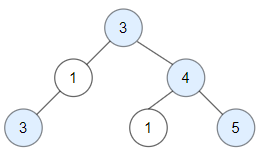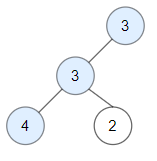Given a binary tree root, a node X in the tree is named good if in the path from root to X there are no nodes with a value greater than X.
Return the number of good nodes in the binary tree.
Example 1:
Input: root = [3,1,4,3,null,1,5] Output: 4 Explanation: Nodes in blue are good. Root Node (3) is always a good node. Node 4 -> (3,4) is the maximum value in the path starting from the root. Node 5 -> (3,4,5) is the maximum value in the path Node 3 -> (3,1,3) is the maximum value in the path.
Example 2:
Input: root = [3,3,null,4,2] Output: 3 Explanation: Node 2 -> (3, 3, 2) is not good, because "3" is higher than it.
Example 3:
Input: root = [1] Output: 1 Explanation: Root is considered as good.
Constraints:
<li>The number of nodes in the binary tree is in the range <code>[1, 10^5]</code>.</li>
<li>Each node's value is between <code>[-10^4, 10^4]</code>.</li>
# Definition for a binary tree node.
# class TreeNode:
# def __init__(self, val=0, left=None, right=None):
# self.val = val
# self.left = left
# self.right = right
class Solution:
def goodNodes(self, root: TreeNode) -> int:
def dfs(root, mx):
if root is None:
return
nonlocal ans
if mx <= root.val:
ans += 1
mx = root.val
dfs(root.left, mx)
dfs(root.right, mx)
ans = 0
dfs(root, -10000)
return ans/**
* Definition for a binary tree node.
* public class TreeNode {
* int val;
* TreeNode left;
* TreeNode right;
* TreeNode() {}
* TreeNode(int val) { this.val = val; }
* TreeNode(int val, TreeNode left, TreeNode right) {
* this.val = val;
* this.left = left;
* this.right = right;
* }
* }
*/
class Solution {
private int ans;
public int goodNodes(TreeNode root) {
ans = 0;
dfs(root, -10000);
return ans;
}
private void dfs(TreeNode root, int mx) {
if (root == null) {
return;
}
if (mx <= root.val) {
++ans;
mx = root.val;
}
dfs(root.left, mx);
dfs(root.right, mx);
}
}/**
* Definition for a binary tree node.
* struct TreeNode {
* int val;
* TreeNode *left;
* TreeNode *right;
* TreeNode() : val(0), left(nullptr), right(nullptr) {}
* TreeNode(int x) : val(x), left(nullptr), right(nullptr) {}
* TreeNode(int x, TreeNode *left, TreeNode *right) : val(x), left(left), right(right) {}
* };
*/
class Solution {
public:
int ans;
int goodNodes(TreeNode* root) {
ans = 0;
dfs(root, -10000);
return ans;
}
void dfs(TreeNode* root, int mx) {
if (!root) return;
if (mx <= root->val) {
++ans;
mx = root->val;
}
dfs(root->left, mx);
dfs(root->right, mx);
}
};/**
* Definition for a binary tree node.
* type TreeNode struct {
* Val int
* Left *TreeNode
* Right *TreeNode
* }
*/
func goodNodes(root *TreeNode) int {
ans := 0
var dfs func(root *TreeNode, mx int)
dfs = func(root *TreeNode, mx int) {
if root == nil {
return
}
if mx <= root.Val {
ans++
mx = root.Val
}
dfs(root.Left, mx)
dfs(root.Right, mx)
}
dfs(root, -10000)
return ans
}

